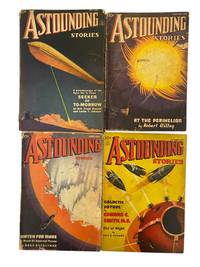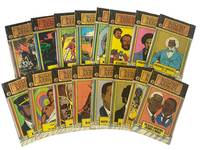by Integration, Women's Education
Panoramic photograph of the Girl Reserve Conference, Pacific Grove, California, June 25 to July 5, 1929. Silver gelatin print. 41" x 8" in. This striking panoramic group portrait documents the Girl Reserve Conference held at Asilomar Conference Grounds in Pacific Grove, California in the summer of 1929—a landmark YMCA-affiliated event promoting character and leadership development for young women. The Girl Reserves, an early 20th-century movement that emerged from the Young Women’s Christian Association (YWCA), sought to empower girls through fellowship, service, and physical education. What makes this photograph exceptional is its vivid and inclusive representation of young women from diverse racial backgrounds—Black, Asian American, and white girls posed together in their signature sailor-style uniforms. In an era still governed by segregationist policies and entrenched social hierarchies, particularly in California and the American West, this image offers rare visual testimony to interracial solidarity in youth programs prior to the Civil Rights Movement.
At the far left of the group stands a lone Black man in a dark suit, positioned prominently among the adult chaperones and teachers. His central placement and formal attire suggest he may have been a leader, instructor, or keynote figure at the conference—an extraordinary and progressive inclusion in 1929, when African American men were rarely given authoritative or public-facing roles in majority-white educational or religious settings. His dignified presence alongside white and Asian American women and girls hints at a subversive and aspirational vision of racial and gender equality within the YWCA’s broader mission. This detail not only underscores the organization's potential as a quietly radical force in youth development, but also elevates the cultural significance of the photograph as a rare artifact of early multiracial collaboration and gender leadership. Creasing along the edges and moderate sepia-toned staining, with one stain affecting image across the lower half. Image remains strong and clear, with excellent contrast across facial details. Overall good condition. A rare and unusually inclusive pre-Depression-era document of interracial female youth leadership and Black male mentorship, emblematic of the quietly progressive spirit cultivated within certain corners of American Protestant youth culture during the interwar period. (Inventory #: 22107)
At the far left of the group stands a lone Black man in a dark suit, positioned prominently among the adult chaperones and teachers. His central placement and formal attire suggest he may have been a leader, instructor, or keynote figure at the conference—an extraordinary and progressive inclusion in 1929, when African American men were rarely given authoritative or public-facing roles in majority-white educational or religious settings. His dignified presence alongside white and Asian American women and girls hints at a subversive and aspirational vision of racial and gender equality within the YWCA’s broader mission. This detail not only underscores the organization's potential as a quietly radical force in youth development, but also elevates the cultural significance of the photograph as a rare artifact of early multiracial collaboration and gender leadership. Creasing along the edges and moderate sepia-toned staining, with one stain affecting image across the lower half. Image remains strong and clear, with excellent contrast across facial details. Overall good condition. A rare and unusually inclusive pre-Depression-era document of interracial female youth leadership and Black male mentorship, emblematic of the quietly progressive spirit cultivated within certain corners of American Protestant youth culture during the interwar period. (Inventory #: 22107)





